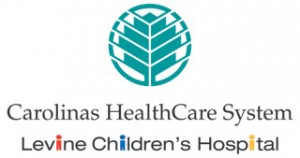February is National Heart Month, and we’ve teamed up with our partners at Levine Children’s Hospital to bring you a series of patient stories that we hope will make a lasting impression. We’ve introduced you to Kyler, caught up with one of our favorite Charlotte families – the Olsens, and brought you Eli’s story. Today’s is the last in our series. This was first posted on Carolinas HealthCare System’s blog.
Throughout the past 2 decades, four physicians have worked together to help one special patient: 18-year-old Kendall Ferguson of Salisbury. Kendall had her second heart transplant at Levine Children’s Hospital in May, but has been seeing doctors with Carolinas HealthCare System’s Sanger Heart and Vascular Institute since she was almost 2 years old.
Kendall’s original care team – transplant surgeon “Robert “Mark” Stiegel, MD, and cardiologist Richard “Tom” Smith, MD – mentored the care team who performed her second surgery 16 years later.
As children grow, they often need a second transplant. However, while the second transplant is needed to save their life, it can be a dangerous procedure as it holds additional risks compared to someone who is undergoing just one transplant.
The United Network for Organ Sharing (UNOS) board, a national board in charge of prioritizing transplant recipients, placed Kendall low on the list, which meant it could take years before Kendall could receive a heart.
Her new care team, including Thomas Maxey, MD, and Gonzalo Wallis, MD, knew that Kendall could not wait years for a new heart soon because she was already experiencing signs of heart failure, and Dr. Wallis felt strongly that she needed a new heart to survive.
Despite the obstacles that made it challenging for Kendall to receive a new heart, Dr. Maxey says Dr. Wallis did not give up on getting Kendall a second heart. “Dr. Wallis picked up the phone and explained the situation to the UNOS board,” he says. “The board agreed with him so she got moved up the list. This is a great example of our doctors going above and beyond for our patients.”
As challenging as a heart transplant is, it’s just the beginning of the recovery process for the patient and the care team, says Dr. Stiegel, who made Carolinas Medical Center history when he participated in the first heart transplant in 1985. He has since performed more than 100 transplants. “Caring for a transplant patient after the operation is the key to their long term survival,” he says. “We have an outstanding team of transplant cardiologists and nurses who follow these patients for their whole lives.”
The Sanger heart transplant team is one of the best in the nation with its one-year- and three-year survival rates exceeding national rates, according to the Scientific Registry of Transplant Recipients. In 2015, Sanger’s one-year survival rate for transplant patients is 94.9 percent, compared to the national average of 90.4 percent. The three-year survival rate is 95.7 percent, compared to the national average of 84.3 percent.
“When you transplant, you are putting someone’s heart in someone else’s body and the body wants to reject this,” says Dr. Maxey. “We try to fool the body into thinking the heart is its own.”
Two heart transplants meant double the risk for Kendall, and all four doctors say they are thrilled with her recovery. She transitioned from pediatric to adult cardiology care, and her former doctors and Levine Children’s Hospital still had a hand in her care even though she had grown up. “We make all decisions as a group,” Dr. Smith says. “I am confident in Dr. Wallis and Dr. Maxey.”
The Sanger team will monitor Kendall and her heart very carefully for the rest of her life. “Kendall has done well,” says Dr. Smith, who has taken care of her the longest. “Our hope is that our transplant patients can be as normal as their peers, and Kendall is.”
Dr. Maxey has assured Kendall she can do just about anything she wants – except sports and roller coaster rides. A year from now she’ll be applying to college. “I need to graduate from high school first and then I am hoping to go to the Outer Banks,” she says.
“We love all those men; they are family,” says Kendall’s grandmother, Lynn Anthony. “You cannot ask for a better group.”
Dr. Stiegel is retiring this year from Carolinas HealthCare System. “I have had a wonderful career and have been blessed by the Lord to have worked in such a remarkable area,” he says. “My hope for the future of our group is that they continue to thrive and remember why we do what we do – the patient and family are the most important thing.”
“(Being) given another chance at life is incredible,” says Kendall. “My message (to others waiting for a transplant) is be patient and don’t give up. The waiting is the hardest part.”
![]()
Levine Children’s Hospital
Facebook
Instagram
Twitter
Pinterest



